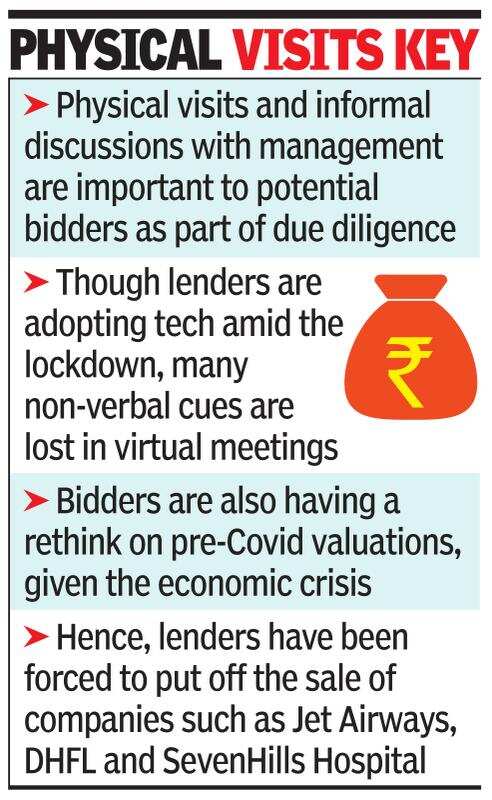
MUMBAI: Lenders who have put on sale assets worth thousands of crores under the insolvency process are finding it difficult to complete deals because of the lockdown. Bidders are reluctant to put in a firm bid as physical visits and informal talks with the management are not happening.
As a result, lenders have kept putting off the last date for sale of companies. Also, bidders who put in expressions of interest are having a rethink on the valuation, given the economic crisis caused by the pandemic.
Banks have been trying to sell several companies like DHFL, Jet Airways and SevenHills Hospital, long before the Covid-19 pandemic broke out and had even received bids. But in these transactions, they are yet to get a firm bid. In the case of Jet Airways, the last date for completing resolution was extended to August 21. Similarly, the sale of DHFL and SevenHills Hospital has also got delayed.
Typically, the sale of a business first involves obtaining expressions of interest, after which the qualifying bidders are granted access to a physical data room, where documents are kept, after signing a non-disclosure agreement. After this, the interested parties put in a firm bid that they must honour, failing which there are penalties.
“Lenders have digitised the process of due diligence and created virtual data rooms where the potential bidders can get access to all documents regarding the sale,” said UV Asset Reconstruction Company director Hari Hara Mishra. However, the key problem is the inability to do a physical inspection.
“Due diligence is the first step for any transaction’s execution. While technology has taken over most of the work and proved efficient too, when it comes to a distressed asset, the base norms are slightly different. On account of trust deficit in a distressed scenario, especially with motivation levels not necessarily being at its optimum levels for the target, the finer touches of diligence become critical,” said law firm Shardul Amarchand Mangaldas & Co partner Veena Sivaramakrishnan. These include discussions with key managerial personnel (KMP) and other non-written information.

“It is like buying a house — until you have visited it personally, you would not get a clear idea about the valuation. Without this, putting in a firm bid is difficult,” he said. He points out that potential bidders are also having second thoughts about pre-Covid valuations as growth prospects have dropped from 6% to -5.9%.
Mishra said, “This is a 12% drop in expected growth and no one has any idea what impact this will have on asset valuations.” Sivaramakrishnan also feels that physical visits are key. “Techno-economic viability, plant/factory visits, interviews with KMPs, etc, are a critical part of any such transaction to ensure smooth continuity of a going concern. From a legal perspective, especially for projects whose assets are real estate, it is imperative to have factory and project visits, which in these times prove to be challenging,” she said.
According to Deloitte India partner Rajiv Chandak, for buyers, it is not just the conversation with management that is key to evaluation. “Physical visits and meetings with management give an idea about the real situation on the ground. A lot of non-verbal cues are lost in virtual meetings. With the virtual presence being the so-called new normal for the time being, it will be interesting to see how bidders adapt to this reality.”
The handful of transactions that have taken place are those that have been in the pipeline where the bidders have had a chance to complete the due diligence before Covid-19 in the previous financial year.
As a result, lenders have kept putting off the last date for sale of companies. Also, bidders who put in expressions of interest are having a rethink on the valuation, given the economic crisis caused by the pandemic.
Banks have been trying to sell several companies like DHFL, Jet Airways and SevenHills Hospital, long before the Covid-19 pandemic broke out and had even received bids. But in these transactions, they are yet to get a firm bid. In the case of Jet Airways, the last date for completing resolution was extended to August 21. Similarly, the sale of DHFL and SevenHills Hospital has also got delayed.
Typically, the sale of a business first involves obtaining expressions of interest, after which the qualifying bidders are granted access to a physical data room, where documents are kept, after signing a non-disclosure agreement. After this, the interested parties put in a firm bid that they must honour, failing which there are penalties.
“Lenders have digitised the process of due diligence and created virtual data rooms where the potential bidders can get access to all documents regarding the sale,” said UV Asset Reconstruction Company director Hari Hara Mishra. However, the key problem is the inability to do a physical inspection.
“Due diligence is the first step for any transaction’s execution. While technology has taken over most of the work and proved efficient too, when it comes to a distressed asset, the base norms are slightly different. On account of trust deficit in a distressed scenario, especially with motivation levels not necessarily being at its optimum levels for the target, the finer touches of diligence become critical,” said law firm Shardul Amarchand Mangaldas & Co partner Veena Sivaramakrishnan. These include discussions with key managerial personnel (KMP) and other non-written information.

“It is like buying a house — until you have visited it personally, you would not get a clear idea about the valuation. Without this, putting in a firm bid is difficult,” he said. He points out that potential bidders are also having second thoughts about pre-Covid valuations as growth prospects have dropped from 6% to -5.9%.
Mishra said, “This is a 12% drop in expected growth and no one has any idea what impact this will have on asset valuations.” Sivaramakrishnan also feels that physical visits are key. “Techno-economic viability, plant/factory visits, interviews with KMPs, etc, are a critical part of any such transaction to ensure smooth continuity of a going concern. From a legal perspective, especially for projects whose assets are real estate, it is imperative to have factory and project visits, which in these times prove to be challenging,” she said.
According to Deloitte India partner Rajiv Chandak, for buyers, it is not just the conversation with management that is key to evaluation. “Physical visits and meetings with management give an idea about the real situation on the ground. A lot of non-verbal cues are lost in virtual meetings. With the virtual presence being the so-called new normal for the time being, it will be interesting to see how bidders adapt to this reality.”
The handful of transactions that have taken place are those that have been in the pipeline where the bidders have had a chance to complete the due diligence before Covid-19 in the previous financial year.
Download
The Times of India News App for Latest Business News
more from times of india business
Quick Links
ELSS Mutual Funds BenefitsIncome Tax Refund statusWhat is AssochamITR Filing Last DateHome Loan EMI TipsHome Loan Repayment TipsPradhan Mantri Awas YojanaTop UP Loan FeaturesIncrease Home Loan EligibilityHome Loan on PFTax Saving Fixed DepositLink Aadhaar with ITRAtal Pension YojanaNita AmbaniIndian EconomyRBIAadhaar CardSBIReliance CommunicationsMukesh AmbaniIndian Bank Ifsc codeIDBI Ifsc codeIndusind ifsc codeYes Bank Ifsc CodeVijay Bank Ifsc codeSyndicate bank Ifsc CodePNB Ifsc codeOBC Ifsc codeKarur vysya bank ifscIOB Ifsc codeICICI Ifsc codeHDFC Bank ifsc codeCanara Bank Ifsc codeBank of baroda ifscBank of America IFSC CodeBOM IFSC CodeAndhra Bank IFSC CodeAxis Bank Ifsc CodeSBI IFSC CodeGST
Get the app








